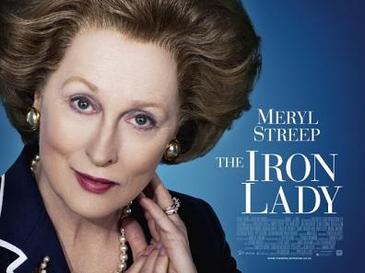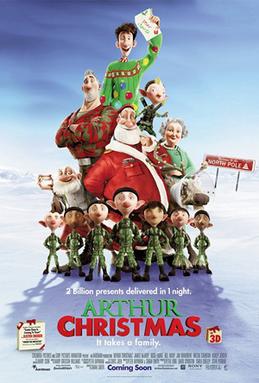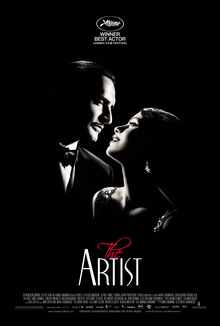 |
| #10 The Iron Lady |
 |
| #9 Arthur Christmas |
 |
| #8 Tinker Tailor Soldier Spy |
For those still concerned that Tinker Tailor Soldier Spy may be too opaque to follow, I offer this: it's an intellectual spy thriller, and espionage isn't suppose to be obvious. Gary Oldman, in one of his greatest screen performances, tell us so much about George Smiley with his perfectly controlled performance. Tinker Tailor is a smorgasbord of brilliant screen actors: John Hurt, Benedict Cumberbatch, Toby Jones, Mark Strong, Tom Hardy, and Colin Firth, all doing their best to show who is best among them, and the younger ones like Hardy and especially Cumberbatch (one to keep your eye on) keeping up with them.
There isn't a false note, one off performance within the film.
I am aware that there were more Smiley stories from John Le Carré, and while Tinker Tailor Soldier Spy ends with the faintest suggestion that there might be a sequel, this may be the first time I don't object to seeing more of The Circus.
 |
| #6 The People vs. George Lucas |
 |
| #6 If A Tree Falls: A Story of the Earth Liberation Front |
A great thing about If A Tree Falls is that it doesn't attempt to rationalize or lionize the actions of the ELF: we get to hear from the investigators, shown to be the efficient people they are, and those whose lumber mills were attacked, not the greedy monsters the ELF and their sympathizers paint them as.
At its heart, If A Tree Falls is about knowing people like McGowan and seeing him not as a monstrous, evil terrorist, but as merely a man, no different than you or me save for his actions. I ended up liking McGowan even if I fiercely reject and condemn his work with the ELF. If I were to ever take some sort of political stance, it would be for a Presidential pardon for Daniel McGowan.
 |
| #5 The Artist |
The Artist has so much going for it: proof of how acting, true acting, doesn't need translations, the joy of films, that we can overlook some of its flaws (in particular the use of the Love Theme from Vertigo). I don't know how good Mr. Dujardin or Miss Berenice Bejo's English is, but what you see on the screen is undeniable: great performances speak for themselves.
 |
| #4 Pariah |
Alike (pronounced A-Lee-Kay) has a remarkably difficult journey: not just to acknowledge her homosexuality to her parents, or even to herself, but to find out exactly who she is. When she's with her butch friends, she is masculine in her attire and manner, down to going by 'Lee'. With her family, she is more feminine even if her parents can't admit to themselves the truth they already know.
Alike has the burden of first love and first love lost, but at the end, she finds out that she doesn't have to fit any image of who she's 'supposed' to be. She becomes herself, and her journey is about to begin. Her final poem about being broken, being open, being free...it's simply some of the most beautiful dialogue I've heard all year.
 |
| #3 Hugo |
Here's how: he's Martin Scorsese: genius. He also is Martin Scorsese: unabashed film enthusiast. Hugo is a love letter to the early days of cinema, where it was done by literal magicians such as French film pioneer Georges Mélies. The loving recreation of Mélies' studio and films are a tribute by one brilliant filmmaker to another. We also couldn't help notice how Scorsese introduced the importance of film preservation into the story and do it so well.
Yes, it is amazing to see a man best know for gritty images of the criminal underworld give us such a lovely portrait of youth and childhood innocence. Hugo has the added bonus of being, with the possible exception of Avatar, the only 3-D film where the 3-D didn't interfere with the story or appear out of place.
There wasn't any 'thrusting out to the audience' images; instead, for me, the most beautiful and brilliant 3-D image will be of a snowy Parisian night.
 |
| #2 Senna |
Documentaries can be a hard sell, but Senna makes brilliant use of the thousands of hours of archival footage to make his life story a remarkable journey: both of Ayrton's soul and his races. Soon, we thoroughly forget we're watching a documentary because we get caught up in the thrill of the race, the antagonism with Senna's racing rivals, his passion for his beloved Brazil and her people, and finally the great heartbreak of his death.
It is a sign of Senna's brilliance that it never feels like anything other than a real movie: we never see it as a dry recitation of facts. It helps that Ayrton Senna's life was never dry. Senna, the documentary, may simply be too good to be remade as a feature.
And now...my choice for the Best Picture of 2011...
 |
| #1 Jane Eyre |
I can't think of a film from 2011 that had such brilliant performances. Michael Fassbender seems to be able to run a wide range, from Magneto to the swoon-worthy Mr. Rochester. Then there's Mia Wasikowska. I don't think I was ever as overwhelmed by a performance as I was with Wasikowska's in Jane Eyre. I cannot help but admire and love Mia Wasikowska for her extraordinary range equal to Fassbender, with the bonus that her career is shorter than his.
Throw in great performances from Dame Judi Dench andJamie Bell, and one of the best adaptations of a literary work. I was totally wrapped in the film at the onset and when it was over, I truly wanted more. I confess to never having read the book, but if it's as good as the movie, it deserves its reputation as a literary classic.
When Mr. Rochester tells Jane, "you transfix me quite", I could have said the same about Jane Eyre: my choice for the Best Picture of 2011.
No comments:
Post a Comment
Views are always welcome, but I would ask that no vulgarity be used. Any posts that contain foul language or are bigoted in any way will not be posted.
Thank you.